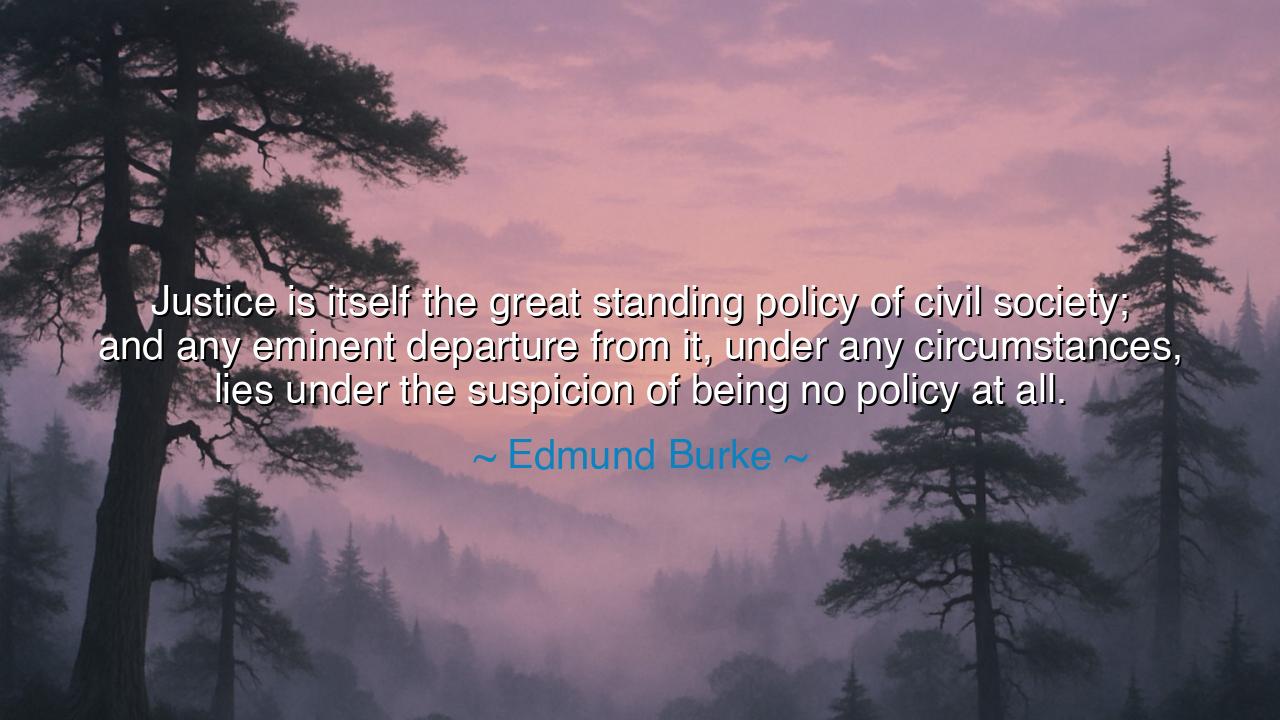
Justice is itself the great standing policy of civil society; and
Justice is itself the great standing policy of civil society; and any eminent departure from it, under any circumstances, lies under the suspicion of being no policy at all.






Hear, O seeker of wisdom, the solemn words of Edmund Burke, who spoke in an age of turmoil, yet whose teaching echoes across centuries: “Justice is itself the great standing policy of civil society; and any eminent departure from it, under any circumstances, lies under the suspicion of being no policy at all.” This is not the speech of convenience, but the eternal decree of reason. For Burke reminds us that justice is not an ornament of nations, nor a tool for rulers, but the very foundation upon which all societies endure. Without it, no policy, no power, no glory can last, for they are built upon sand and not upon stone.
The meaning of this teaching is radiant: in the affairs of men, many policies rise and fall—policies of war, of commerce, of conquest, of reform. Yet all these are but branches. The root, the trunk, the great standing pillar, is justice. If a nation forsakes justice, even in the pursuit of wealth or power, it undermines its own soul. What appears as strategy is but folly; what appears as strength is but weakness disguised. Thus Burke proclaims that when justice is abandoned, no policy remains at all—only the shadow of ruin.
Consider the story of the Roman Empire. Rome, in her early days, was bound by laws carved into bronze, the Twelve Tables, and her citizens trusted that justice would govern even the mighty. It was this devotion to order and law that made Rome strong, binding together diverse peoples into one civilization. Yet as centuries passed, emperors placed ambition above justice. They persecuted the innocent, seized lands without right, taxed without mercy, and enslaved whole nations. For a time, Rome seemed unshaken, her legions unconquerable. But the rot of injustice ate away at her core, until at last the empire crumbled. What Rome had mistaken for policy—oppression, greed, cruelty—was no policy at all, but the herald of her downfall.
So too in more recent days, let us recall the tragedy of South Africa under apartheid. The rulers believed they had devised a “policy” to preserve order, dividing man from man by color of skin. Laws were written, enforcements made, profits taken. Yet this system, though clothed in the garments of policy, was in truth nothing but an eminent departure from justice. It sowed bitterness, violence, and despair. Only when apartheid was cast down, and justice restored as the guiding star, could the nation begin to heal and rise again. Thus history declares with Burke: policy without justice is no policy, but a curse upon the land.
Mark well, O listener, that Burke’s teaching is not only for kings and parliaments, but for every soul. For every household, every company, every gathering of people is a kind of society. If it is governed by fairness, by respect, by justice, it flourishes. But if it descends into deceit, into exploitation, into betrayal of the weak, then its schemes, however clever, will collapse. No cunning, no wealth, no sword can preserve a people who abandon justice.
Let this be the lesson: live by justice, and let it be your standing policy in all dealings. Speak truth, though it is hard. Act with fairness, though it costs you much. Defend the weak, though it burdens your strength. For the moment you abandon justice, even in small things, you build not a policy but a delusion, and the harvest of delusion is always destruction.
Therefore, O child of tomorrow, walk as Burke counsels: make justice your root, your pillar, your law. Let it be the first measure of every policy, every plan, every dream. For kingdoms rise and fall, but justice endures, shining as the eternal foundation of all that is noble. And remember this final truth: the nation that abandons justice digs its own grave, but the soul, the people, the society that upholds justice will live long, blessed by harmony and strengthened by trust.
Thus, take this teaching as a shield and a staff: justice is the only true policy, and without it, all else is vanity.






AAdministratorAdministrator
Welcome, honored guests. Please leave a comment, we will respond soon